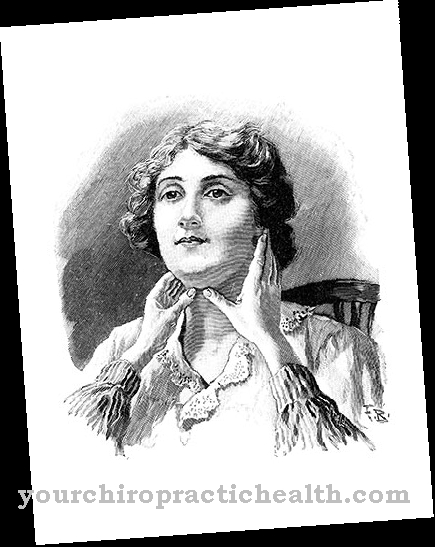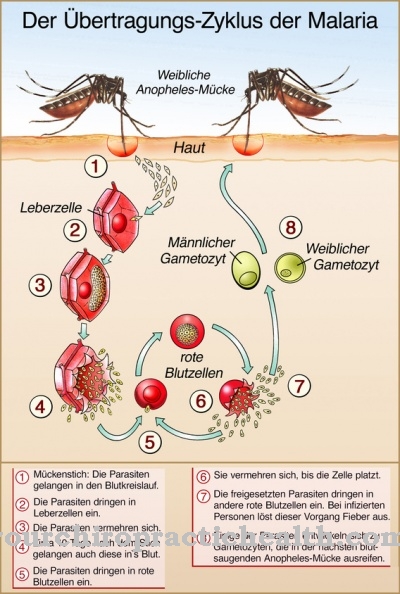A Cryptitis is an inflammatory disease affecting the human rectum. It is particularly caused by problems with bowel movements, which lead to inflammation of the anal papillae. An infection of the anal gland itself can develop on it later.
What is cryptitis?

© Med Photo Studio - stock.adobe.com
Under the name Cryptitis Doctors understand inflammation in the rectum. The transition from the anal canal to the rectum consists of anal papillae and so-called crypts.
The latter are pockets that open into the anal glands. If one of these mouths becomes blocked, cryptitis develops, an inflammation that can later develop into an infection of the anal gland itself. Most of the time, problems with bowel movements are responsible for the inflammation, in which feces enter the pockets of the anal papillae.
The cryptitis often goes unnoticed at first until it manifests itself through symptoms such as itching, pain or a foreign body sensation in the area of the anus. In many cases the disease proceeds without complications; In individual cases, however, surgical intervention may be necessary to open the abscesses that have developed.
causes
The causes of a Cryptitis in most cases are problems with bowel movements. Normally the bowel is emptied without feces getting into the crypts or settling there.
However, if there is a blockage, for example, so that no emptying can take place over a long period of time, the manure may be pressed back. In this way he can also get into the crypts. Since the excrement is usually very hard in this state, it can happen that the sensitive mucous membrane is injured.
If the stool comes into contact with these, inflammatory conditions develop; Experts then speak of cryptitis. The infection can also develop if the person concerned has long-term stools that are too soft or mushy and the stool becomes stuck in the crypts for a long time.
Symptoms, ailments & signs
The symptoms of cryptitis are quite typical. These often coincide with the symptoms of an anal fistula. As the condition arises, itching in the anal region and painful bowel movements occur. This pain during or after emptying is the main symptom of cryptitis. Occasionally there is also bleeding after a bowel movement.
After a while, defecation disorders increase. The stool is restrained and hard. In addition, there is a feeling in the anal region as if there is a foreign body in it. This can lead to continued stool retention, which occasionally leads to constipation. The hard stool also leads to further pain.
The increasing inflammation can lead to a burning sensation in the anus. The itching usually persists. Eventually, the inflammation can lead to the formation of abscesses and fistulas, which increase the feeling of foreign objects and pain during and after a bowel movement. The abscess formation can be accompanied by general malaise and fever.
Psychological symptoms of cryptitis are above all an increased feeling of shame and a great deal of suffering due to the problematic toilet visits. The feeling of shame feeds mainly from the area that is affected by cryptitis.
Diagnosis & course
A Cryptitis is often not recognized directly, as the symptoms are very similar to those of a hemorrhoid disease and the inflamed crypts are mistakenly mistaken for hemorrhoids.
If a doctor is consulted because of itching, burning or pain after a bowel movement, this can only be determined by means of a very precise examination with the finger. The affected region in the anal area is scanned piece by piece and also examined with an anal speculum and a very thin probe.
Colonoscopies or similar examination methods provide a meaningful diagnosis here. If left untreated, cryptitis leads to more severe bowel movement problems and is associated with pain and other unpleasant symptoms. It can develop into abscesses or fistulas, which may then need to be surgically removed.
Complications
Because of the cryptitis, those affected suffer from various complaints, which mainly occur in the intestines and stomach. The quality of life of the patient is significantly restricted and reduced by the cryptitis. Those affected primarily suffer from severe pain that occurs when defecating.
It is not uncommon for psychological complaints or depression to occur. It is not uncommon for those affected to suffer weight loss as a result, as less food is deliberately ingested to prevent bowel movements. Itching can also develop. Many patients are ashamed of these symptoms, which often leads to late treatment. Those affected can also complain of a foreign body sensation in the anus.
In most cases, cryptitis can be treated relatively well and easily. As a rule, there are no particular complications or other complaints. The life expectancy of the person affected is usually not reduced by cryptitis. The patient must also pay attention to a healthy diet. Furthermore, various exercises of the sphincter muscle can also relieve the symptoms. In most cases, the disease progresses positively in the patient.
When should you go to the doctor?
If pain and discomfort occurs repeatedly during bowel movements, a doctor should be consulted. If the food intake is balanced and healthy, abnormalities in the droppings are considered a warning and must be clarified by a doctor. With adequate hydration, peculiarities of bowel movements are a sign of an irregularity that needs to be investigated and treated. If the stool is soft to mushy for several days or weeks, a doctor should be consulted. If the symptoms spread or existing pain increases, a doctor is required. If the anus is itchy, open wounds or bleeding occurs, a doctor should be consulted.
Pathogens can get into the organism which, in severe cases, cause blood poisoning. A doctor's visit is therefore necessary as soon as pus forms at the exit of the intestine or there is severe reddening of the anus. If the person concerned perceives the feeling of a foreign body or a diffuse feeling of pressure in the area of the rectum, a doctor should be consulted. A doctor should be asked for help in the event of inner restlessness, problems with locomotion or discomfort in a sitting position. If there is a general feeling of illness, an increased body temperature or if the person concerned refuses to eat because of the symptoms, a doctor must be consulted.
Treatment & Therapy
Became a Cryptitis diagnosed, it can usually be treated quite well. In order to eliminate the inflammation, the attending physician will prescribe appropriate medication. These must be given directly on or into the affected region.
These are creams, ointments or even suppositories that can best reach the exact location of the inflammation in the crypts. If abscesses or fistulas have already formed or if the inflamed crypts are so badly affected that they can no longer be treated with medication, surgical intervention must take place. As a result, the patient himself can do a lot to alleviate the symptoms.
This often includes adjusting your diet so that your bowel movements are firm and regular. Sphincter exercises improve blood circulation in the anal area and also help the cryptitis heal more quickly. The same applies to a gentle massage of the anal rim with your finger.
Outlook & forecast
The prognosis of cryptitis is described as favorable. Under normal circumstances, a diagnosis is made followed by a treatment plan. This provides for a short treatment time, which then ends with no symptoms. Without medical care, there is a risk of secondary disorders and serious health consequences. The intestine can no longer fully perform its natural work due to the retention of the feces. In particularly severe cases, tumors can develop or pain can develop. If the possibility of treatment is still ruled out, the person concerned is at risk of premature death.
In collaboration with a doctor, preparations are administered that provide rapid relief from the symptoms. Inflammatory processes are stopped and regular bowel movements are monitored. With massages in the anal area, the person affected can also independently contribute to improving their health. This supports the recovery process and prevents secondary disorders.
If tissue changes develop, the removal of these secondary disorders can be arranged in some patients. Interventions of this type usually run without further complications and are characterized by a short treatment time. After the wound healing has subsided, the affected person is released from therapy as recovered. Despite good prospects of recovery, cryptitis can recur in the course of life. It is therefore advisable to obtain adequate information about a healthy bowel movement.
prevention
One Cryptitis can to some extent be prevented by a balanced diet and regular bowel movements of firm, but not too hard, consistency. This can prevent feces from settling in the crypts and causing inflammation. If symptoms such as pain or itching occur in the anal region, a doctor should be consulted.
Aftercare
After healing, cryptitis does not require any follow-up care. The patient can continue his normal life. There are no major restrictions in everyday life. A balanced diet is recommended to avoid further complications. But this is necessary anyway for a healthy and balanced life.
The responsibility for this lies in the patient's area of life. Doctors can arrange for nutritional advice if necessary. If treatment is delayed, the duration of therapy can be extended to several months. In addition to taking painkillers, massages and sphincter exercises are also necessary. Follow-up care takes place after individual consultation and depends on the scope of the complaint.
During the scheduled follow-up examinations, the anus area is scanned. A colon mirroring also provides clarity about the persistence of the cryptitis. Follow-up care is usually associated with cancer. It is intended to detect a life-threatening new formation in the early stages. Doctors thus promise the best possible treatment success.
In contrast, cryptitis usually does not threaten the life of those affected. A new formation from an initial illness is also almost impossible. The avoidance of a recurrence of cryptitis results from a general change in eating habits. The patient only consults his doctor if there are acute signs of the rectum.
You can do that yourself
Cryptitis can be well accompanied by the person concerned during the healing process. This requires changes in diet and gentle care of the affected areas - in addition to any medication.
For example, the diet should be changed in such a way that the person affected enables a regular, not too soft, stool that is present in one piece. This is achieved through a diet rich in fiber (flea seeds, dried fruits, etc.). Exercise also helps the intestine to thicken the stool and remove water from it. More regular bowel movements can prevent feces from sticking to the inflamed areas. In addition, regular bowel movements are less stressful for the anal area.
Sitz baths, fortified with essential oils, tannins, or sea salt, can help relieve pain caused by cryptitis. However, they are not suitable for causal treatment. The anus region itself should be stimulated to a blood flow in order to accelerate the healing process. Massages of the edge of the anus and careful stretching exercises can be used for this.
Self-help measures are no longer sufficient for cryptitis that has already formed fistulas or abscesses. A healing of such severe inflammation is very unlikely without medical help.

.jpg)




.jpg)





.jpg)



.jpg)










.jpg)
